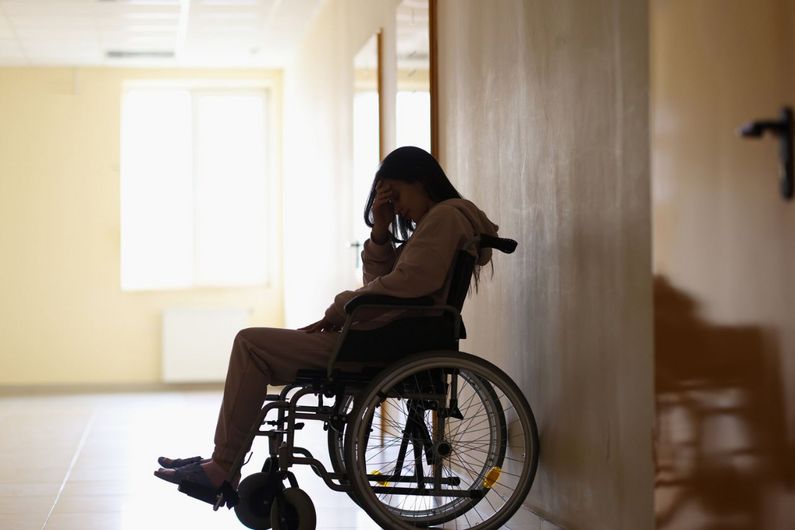Caught in the middle
- UdeMNouvelles
12/01/2023
- Béatrice St-Cyr-Leroux
Women with disabilities who experience intimate-partner violence face substantial barriers when they decide to leave their partners. But UdeM's Martine Lévesque is working to change that.
Women with disabilities who experience intimate-partner violence are doubly vulnerable. On the one hand, they may not be able to see, hear, communicate, understand or move about on their own. At the same time, they find themselves controlled, manipulated and physically, psychologically or sexually abused by their intimate partners.
Little has been written about this combination of challenges, but it is hardly rare: women with disabilities are twice as likely to experience violence in intimate relationships. They are especially vulnerable, because in addition to being socially isolated by their disabilities, they often live in situations where they are dependent on their partners.
It takes courage to leave any violent intimate relationship. Imagine the effort it takes for a woman living with a cognitive or physical disability, when there are almost no adapted services available to give her the support she needs.
For example, first responders receive little training in how to adapt their interventions to meet the needs of women with sensory or linguistic deficits. Women’s shelters are rarely universally accessible and cannot accommodate women who need help with activities of daily living. And there is no accessible public transit system to enable women with disabilities to leave their homes in an emergency.
Such obstacles to escaping intimate-partner violence exist to varying degrees throughout Quebec. Martine Lévesque, a professor of occupational therapy in the School of Rehabilitation at Université de Montréal and a researcher at its affiliated Montreal Research Centre on Social Inequality and Discrimination (CREMIS) is tackling these barriers head-on in the Montreal area.
A participatory project
Lévesque is currently conducting an intersectoral participatory action research project on the structural barriers that trap women with disabilities in the cycle of intimate-partner violence and prevent them from reaching safety.
Lévesque’s research falls within the field of occupational science and is based on the concept of occupational justice: the right of all individuals to engage in activities that give meaning to their lives and contribute to their health, well-being and, in this case, safety.
“From this perspective, all women must be able to engage in meaningful, essential occupations throughout the process of leaving a violent relationship,” Lévesque argued. “They must be able to communicate their need for help, to move about in motorized wheelchairs, to have access to women’s shelters, to participate in the social life of these shelters and to maintain their autonomy and their social roles—such as their role as mothers—while living there.”
In her research, Lévesque has found many forms of systemic exclusion that make these women more vulnerable. First, she points to the persistence of certain stereotypes about people with disabilities that make it harder for them to seek help, such as the tendency to infantilize them or to assume that they have no sex lives or that they cannot be competent witnesses.
'Institutionalized able-ism'
“This is a kind of institutionalized able-ism that discriminates against people with disabilities and subjects them to other forms of violence—when violence is precisely what they’re trying to escape,” said Lévesque. “For example, one woman with visual impairment who was assaulted told me that a police officer was scornful because she couldn’t provide a precise visual description of her attacker.”
To end such situations, Lévesque worked with RAPLIQ, a Quebec-wide group that advocates for the inclusion of people with disabilities, to set up a partnership that includes community agencies (such as women’s shelters and the MFSM, a centre for deaf women in Montreal), the CIUSSS Centre-sud-de-l’Île-de-Montréal health board, the Montreal police department and other CREMIS researchers.
The group has analyzed and addressed intersectoral structural barriers. For example, they have developed a protocol for police to call for adapted transport when a women who uses a wheelchair needs emergency transportation. They have also launched a pilot project to make women’s shelters more accessible.
But the group believes that education and awareness-raising are still the most powerful weapons at their disposal. For example, they have worked with the MFSM and the Montreal police to develop a training module for Quebec police departments around deaf women who experience intimate-partner violence, where importance is placed on having female interpreters trained in Quebec Sign Language to collect and record witness statements.
But more research is needed, Lévesque believes.
“Intimate-partner violence affects all women,” she said, “and all the players involved in this issue need to be sensitized to it.”














